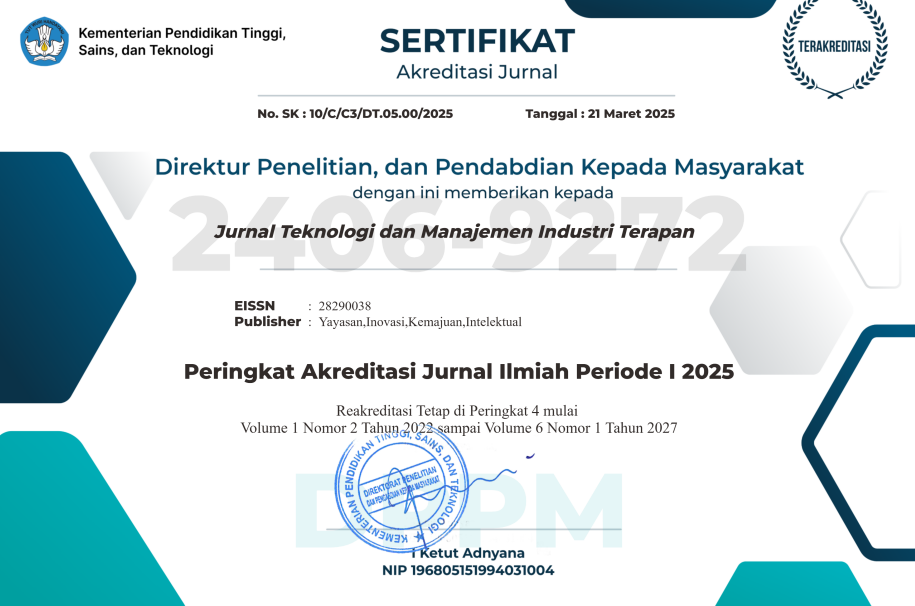Analisa Pengaruh Porositas Kain Tenun terhadap Penyerapan Zat Warna Menggunakan Image Processing
DOI:
https://doi.org/10.55826/jtmit.v4i2.605Keywords:
Desain Anyaman, Image Processing, Penyerapan Zat Warna, Porositas Kain, SpektrofotometriAbstract
Penelitian ini bertujuan untuk menganalisis pengaruh porositas kain tenun terhadap penyerapan zat warna menggunakan metode pengolahan citra digital. Porositas diukur melalui citra hasil pemindaian sampel kain dengan pendekatan thresholding menggunakan perangkat lunak berbasis Java. Metode statistik Kruskal-Wallis digunakan untuk menguji signifikansi perbedaan porositas dan nilai K/S antar jenis anyaman. Hasil menunjukkan korelasi negatif yang signifikan (r = - 0.858) antara porositas dan nilai K/S, dengan kontribusi porositas sebesar 73,65% terhadap variasi penyerapan warna. Jenis anyaman satin menunjukkan performa terbaik dalam penyerapan zat warna, sesuai dengan teori peningkatan kontak antar serat. Penelitian ini memberikan kontribusi pada pengembangan metode kuantitatif dalam evaluasi kualitas kain menggunakan teknologi pengolahan citra.
References
D. B. Dilden, M. F. Yüksel, S. Keskin, U. Ergünay, and R. Atav, “Determination of The Effect of Dyeing and Finishing Processes on Physical, Mechanical, Handle, Comfort and Functional Properties of Cotton Knitted Fabrics,” Orclever Proceedings of Research and Development, vol. 1, no. 1, pp. 167–177, Dec. 2022, doi: 10.56038/oprd.v1i1.173.
N. S. Elshemy, M. H. Elshakankery, S. M. Shahien, K. Haggag, and H. El-Sayed, “Kinetic Investigations on Dyeing of Different Polyester Fabrics Using Microwave Irradiation,” Egypt J Chem, vol. 60, no. Conference Issue, pp. 3–5, Dec. 2017, doi: 10.21608/ejchem.2017.1604.1131.
E. Z. YILDIZ and G. PAMUK, “The effect of loop length, yarn twist and dyeing process on seam strength of knitted fabrics,” Industria Textila, vol. 73, no. 05, pp. 554–559, Oct. 2022, doi: 10.35530/IT.073.05.202174.
A. Kalazić, T. Badrov, I. Schwarz, and S. Brnada, “Incorporating Variable Porosity into the Determination of Effective Permeability in Interchanging Double Cloth Woven Fabrics Using Darcy’s Law,” Polymers (Basel), vol. 15, no. 14, p. 3048, Jul. 2023, doi: 10.3390/polym15143048.
S. H. S. H. Yousfani, S. Farooq, Q. Mohtashim, and H. Gong, “Yarn porosity and its relationship with the dyeing behavior,” Pigment & Resin Technology, vol. 52, no. 6, pp. 747–754, Nov. 2023, doi: 10.1108/PRT-12-2021-0138.
N. Elshemy, M. Elshakankery, S. Shahien, K. Haggag, and H. El-Sayed, “Kinetic Investigations on Dyeing of Different Polyester Fabrics Using Microwave Irradiation,” The Egyptian Journal of Chemistry, vol. 60, pp. 79–88, 2017, doi: 10.21608/EJCHEM.2017.1604.1131.
Y.-W. Wang, Q.-Z. Yi, Y. Ding, F. Ji, and N. Wang, “Study on the factors influencing the dyeing performance of cotton fabric with vat dyes based on principal component analysis,” The Journal of The Textile Institute, vol. 112, pp. 1460–1466, 2020, doi: 10.1080/00405000.2020.1824432.
S. H. S. Yousfani, S. Farooq, Q. Mohtashim, and H. Gong, “Yarn porosity and its relationship with the dyeing behavior,” Pigment & Resin Technology, p., 2022, doi: 10.1108/prt-12-2021-0138.
E. Rápó and S. Tonk, “Factors affecting synthetic dye adsorption; desorption studies: A review of results from the last five years (2017–2021),” Sep. 01, 2021, MDPI. doi: 10.3390/molecules26175419.
U. Syed, “The influence of woven fabric structures on the continuous dyeing of Lyocell fabrics with reactive dyes,” p., 2010, [Online]. Available: https://consensus.app/papers/the-influence-of-woven-fabric-structures-on-the-continuous-syed/2d3de482e5ad5fd38039e36849dfd651/
Ž. Zupin, V. Štampfl, T. N. Kočevar, and H. Gabrijelčič Tomc, “Comparison of Measured and Calculated Porosity Parameters of Woven Fabrics to Results Obtained with Image Analysis,” Materials, vol. 17, no. 4, Feb. 2024, doi: 10.3390/ma17040783.
K. Kostajnšek, Ž. Zupin, A. Hladnik, and K. Dimitrovski, “Optical Assessment of Porosity Parameters in Transparent Woven Fabrics,” Polymers (Basel), vol. 13, p., 2021, doi: 10.3390/polym13030408.
T. Rolich, D. Domović, G. Čubrić, and I. Salopek Čubrić, “Advanced Image Analysis and Machine Learning Models for Accurate Cover Factor and Porosity Prediction in Knitted Fabrics: Tailored Applications in Sportswear, Swimwear, and Casual Wear,” Fibers, vol. 12, no. 5, May 2024, doi: 10.3390/fib12050045.
R. A. Angelova, “Determination of porosity of textiles with an uneven pore size,” Comptes Rendus de L’Academie Bulgare des Sciences, vol. 73, no. 1, pp. 96–102, 2020, doi: 10.7546/CRABS.2020.01.12.
Ž. Zupin, A. Hladnik, and K. Dimitrovski, “Prediction of one-layer woven fabrics air permeability using porosity parameters,” Textile Research Journal, vol. 82, no. 2, pp. 117–128, Jan. 2012, doi: 10.1177/0040517511424529.
H. A. Kim, Y. Kim, and S. J. Kim, “Effect of Porosity Characteristics of Hollow Composite Yarns to the Comfort Property of the Fabrics for the High Emotional Garment,” vol. 26, pp. 218–229, 2014, doi: 10.5764/TCF.2014.26.3.218.
S. Islam and A. Mozumder, “Effect of weave structures and thread densities on the cover factor and mechanical properties of cotton spandex woven fabrics,” The Journal of The Textile Institute, vol. 115, pp. 479–489, 2023, doi: 10.1080/00405000.2023.2201106.
A. Haerudin, M. R. Purnomo, and S. Ma’mun, “ZAT WARNA ALAMI BERBASIS LIMBAH SABUT KELAPA MUDA (COCO NUCIFERA) UNTUK PEWARNAAN KAIN BATIK The Natural Dye Based On Young Coconut Coir Waste For Batik Fabric Dyeing,” Dinamika Kerajinan dan Batik: Majalah Ilmiah, vol. 39, no. 1, pp. 101–112, Jun. 2022, doi: 10.22322/dkb.V36i1.4149.
Downloads
Published
Issue
Section
License
Copyright (c) 2025 Amar, Verawati Nurazizah, Mohadi, Hendri Pujianto, Sepdhina Annisa Nur Rahma

This work is licensed under a Creative Commons Attribution-NonCommercial-ShareAlike 4.0 International License.


















